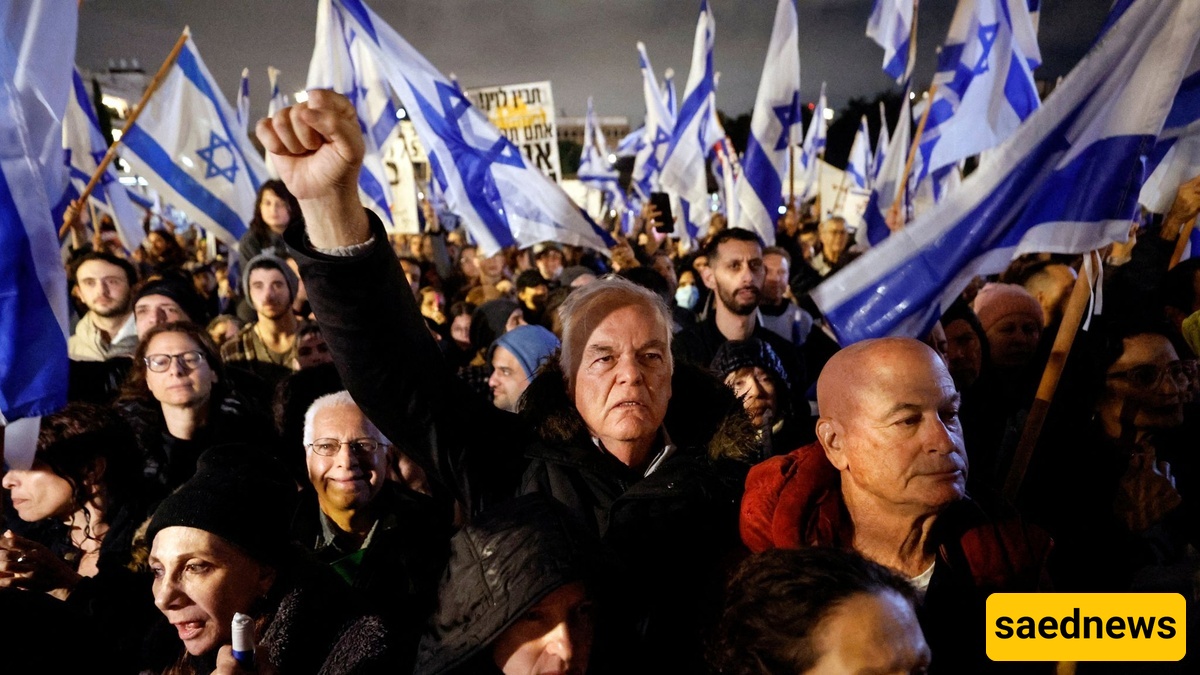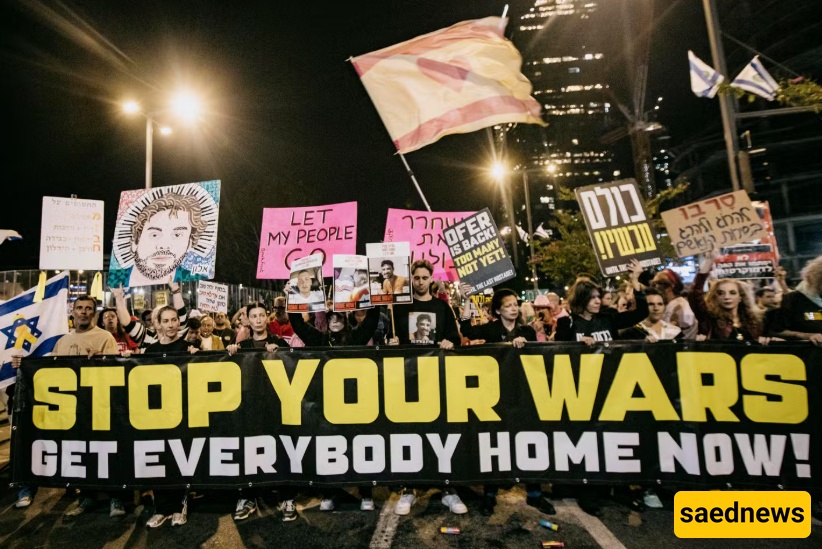SAEDNEWS: Thousands of Israeli citizens gathered in Tel Aviv’s main squares to express their opposition to the government’s plan to expand the war in Gaza. This protest not only reflects widespread public fatigue from prolonged conflicts but also highlights the deep political and social divisions forming within Israel.

According to Saed News, quoting France 24, on an evening when the air in Tel Aviv was filled with summer heat and the noise of the crowd, thousands of city residents took to the streets to voice their opposition to Benjamin Netanyahu’s government’s hawkish war policies. This protest arose as a direct reaction to the government’s plan to expand military operations in the Gaza Strip—a plan that opponents say not only pushes the prospect of ending the conflict further away but also risks triggering a broader humanitarian crisis in the volatile region.
The crowd’s slogans ranged from demands for an immediate halt to military operations to calls for the dismissal of senior cabinet officials. Many protesters carried placards bearing messages such as “No to endless war” and “Security comes through peace.” Well-known figures from opposition political factions and human rights activists were also present among the crowd, delivering speeches critical of current policies.

This gathering took place while Gaza has endured months of continuous bombings and bloody clashes. Reports indicate that humanitarian conditions in the area have become severely critical, with vital infrastructure—ranging from hospitals to water and electricity facilities—suffering serious damage. Despite this, the Israeli government has stated that expanding the scope of operations is necessary to achieve its “security objectives,” a move critics describe as the continuation of a failed strategy that has not brought lasting security over the past two decades.
Analysts believe these protests are not merely an emotional reaction to a military plan but are rooted in deeper political and social developments. Israeli society in recent years has faced increasing divides over issues such as judicial reforms, economic policies, and approaches to the Palestinians. Against this backdrop, the escalation of the Gaza war acted as a spark, bringing accumulated discontent onto the streets.
On the other side, supporters of the government and part of the public opinion argue that military pressure on Hamas and other armed groups in Gaza is necessary to prevent attacks and security threats. They believe that retreating or halting operations at this stage could strengthen these groups. However, opponents of this view, citing past experiences, say that the cycle of violence cannot be broken solely by military means and requires political and diplomatic approaches.
At Habima Square in Tel Aviv, the sound of drums and protest chants created a unique atmosphere. Many participants were families expressing concerns about the deaths of young soldiers on the front lines and the harm to Palestinian civilians alike. This coexistence of humanitarian and national concerns was a distinctive feature of this protest wave, setting it apart from some previous demonstrations.
International media quickly covered the event, and its images reached front pages of newspapers and news websites. Analysis published highlighted that the continuation of such movements could increase internal pressure on the Israeli government and even alter the political dynamics within the cabinet. Some analysts even suggested that, if protests intensify, fractures within the ruling coalition could emerge, complicating the management of the ongoing war.
However, historical experience shows that changing Israel’s security policies is a complex and time-consuming process. The country’s security and military decision-making structure is such that even public pressure does not always lead to immediate shifts. Additionally, regional conditions and international pressures play significant roles in shaping policy directions.
In this context, domestic and international human rights organizations have warned that any escalation of military operations will bring Gaza’s humanitarian crisis to unprecedented levels. They have called for an immediate halt to attacks and the start of ceasefire negotiations. In contrast, Israeli officials insist that without eliminating “fundamental security threats,” sustainable peace is unattainable.
The Israeli political scene is now at a critical juncture: on one side, a government that rose to power with security slogans and emphasizes continued military pressure; on the other, a segment of society that clearly states security and stability come through peace and negotiation. The outcome of this confrontation could have a decisive impact on the course of the Israeli-Palestinian conflict.
The Tel Aviv protest demonstrated that even in a society where security threats are always paramount concerns, the desire to end the war and seek political solutions can generate strong public mobilization. How far and in what way this protest energy can change the ruling policies is a question that will become clearer in the coming weeks and months.
This protest was neither the first nor likely the last collective action against the government’s Gaza policies. But it may be said that the scale and diversity of participants is a sign of a transformation in Israel’s political and social atmosphere— a transformation that, if sustained, could influence the conflict’s trajectory and even Netanyahu’s government position.
Ultimately, that night Tel Aviv’s squares were not only venues for protesting a war plan but also stages for expressing a desire for peace and an end to violence. From many participants’ perspective, the main message was simple and clear: the people are tired, and this fatigue could mark the beginning of a new chapter in the complex equations of the Middle East.

